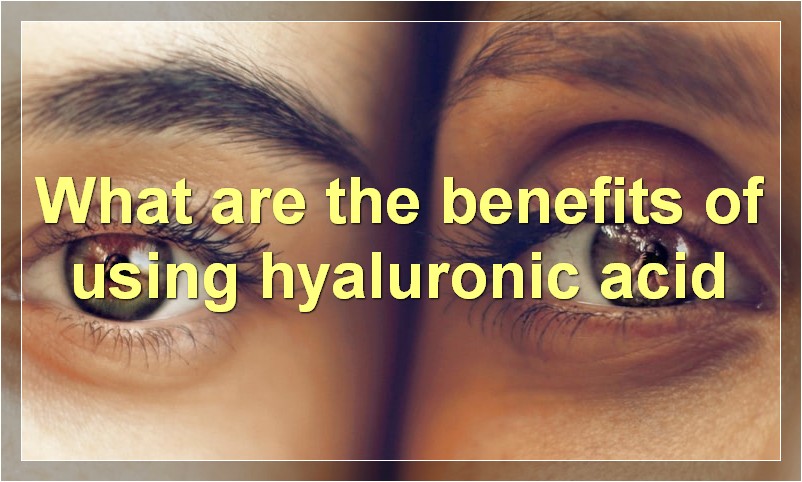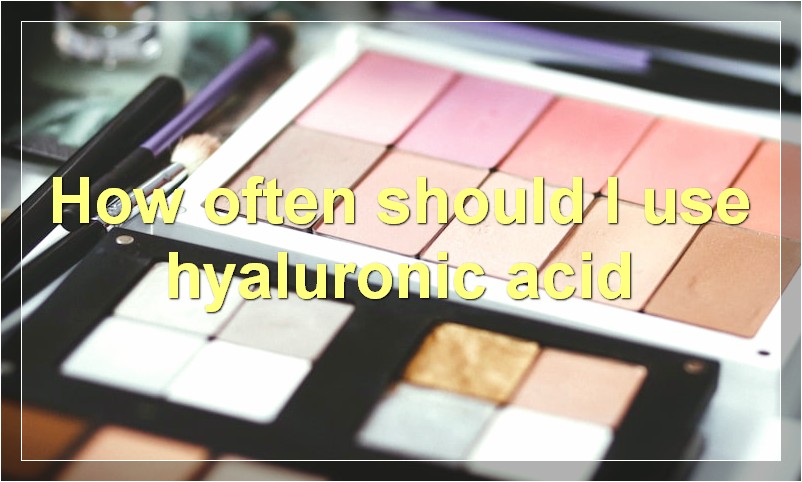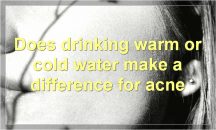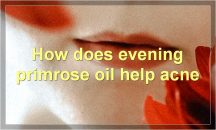If you suffer from acne, you know the drill: find a spot, watch it grow, try to pop it (we know you shouldn’t, but we all do anyway), then cover it up with concealer and hope for the best. But what if we told you there was a way to fight acne before it even starts? Hyaluronic acid is that secret weapon.
What is hyaluronic acid
Hyaluronic acid is a molecule that is naturally occurring in the human body. It is found in the highest concentrations in the fluid that lubricates our joints, and is also a major component of skin. This substance holds water, keeping tissues hydrated and plump.
As we age, our bodies produce less hyaluronic acid. This decrease leads to drier skin, wrinkles, and joint pain. Supplementing with hyaluronic acid can help to keep the body’s levels up, resulting in plumper skin and fewer wrinkles. Additionally, it can help to lubricate the joints, reducing pain and inflammation.
Hyaluronic acid is available in supplement form, and can also be found in some skincare products. When applied topically, it can help to hydrate and plump the skin. It is also sometimes injected into the joints to help lubricate them and reduce pain.
If you are interested in supplementing with or using hyaluronic acid, be sure to speak with your doctor first to ensure it is safe for you.
What are the benefits of using hyaluronic acid

If you’re like most people, you probably think of hyaluronic acid as something that’s good for your skin. And you’re right! This powerful ingredient does wonders for the complexion, helping to keep it hydrated, plump, and youthful. But did you know that hyaluronic acid can also be beneficial for other parts of the body? Here are some of the ways this versatile substance can improve your health:
1. Hyaluronic acid can help relieve joint pain.
If you suffer from osteoarthritis or other joint problems, you know that the pain can be debilitating. Luckily, hyaluronic acid can help. This substance is a natural lubricant and cushion for joints, and it’s been shown to reduce pain and improve mobility in people with arthritis.
2. Hyaluronic acid can improve heart health.
Studies have shown that hyaluronic acid can reduce inflammation and improve blood flow in the cardiovascular system. This means that it could help to prevent heart disease and stroke.
3. Hyaluronic acid can aid in wound healing.
This substance helps to keep wounds moist, which speeds up the healing process. It also helps to reduce scarring.
4. Hyaluronic acid can boost brain health.
This ingredient is thought to improve cognitive function and protect the brain from age-related damage. It may also help to prevent Alzheimer’s disease and other forms of dementia.
5. Hyaluronic acid can improve digestive health.
This substance is a natural laxative, so it can help to relieve constipation and promote regularity. It’s also thought to aid in the absorption of nutrients from food and help to protect the gut from harmful bacteria.
How does hyaluronic acid help with acne
What are the side effects of using hyaluronic acid
Hyaluronic acid is a substance that is naturally present in the human body. It is found in the highest concentrations in the fluid that lubricates joints. Hyaluronic acid also plays an important role in wound healing.
The body’s production of hyaluronic acid decreases with age, which may contribute to the development of osteoarthritis. Several companies produce supplements containing hyaluronic acid, which is also available in topical form.
Hyaluronic acid is generally safe and well-tolerated. The most common side effects are temporary and include injection site pain, redness, and swelling.
Some people may be allergic to hyaluronic acid or experience more severe side effects, such as headaches, fever, and muscle aches. If you experience any side effects after taking a supplement or using a topical product containing hyaluronic acid, stop using it and seek medical attention if necessary.
Is hyaluronic acid safe to use
Is hyaluronic acid safe to use? This is a question that many people ask when they are considering using this popular skincare ingredient.
Hyaluronic acid is a naturally occurring substance in the body that helps to keep the skin hydrated and plump. It is also found in some cosmetic products, such as serums and moisturizers.
While there is no evidence to suggest that hyaluronic acid is unsafe for topical use, some people may experience mild skin irritation. If you have sensitive skin, it is always best to perform a patch test before using any new skincare product.
overall, hyaluronic acid is a safe and effective skincare ingredient that can help to improve the appearance of your skin.
How often should I use hyaluronic acid

Hyaluronic acid is a substance that occurs naturally in the human body. It is found in the highest concentrations in the joints and eyes. This substance provides lubrication and shock absorption for these tissues. It is also a major component of skin, where it helps to keep it hydrated and plump.
The concentration of hyaluronic acid in the body decreases with age. This results in drier skin, more wrinkles, and less cushioning for the joints. Supplementing with hyaluronic acid can help to offset these effects of aging.
Most experts recommend using a hyaluronic acid supplement daily, in order to maintain optimal levels in the body. This can be taken in the form of capsules or as a topical serum. When applied to the skin, it is important to use a product that also contains sunscreen, as this ingredient can make the skin more sensitive to sunlight.
How long does it take for hyaluronic acid to work
Assuming you would like an article discussing the benefits of hyaluronic acid:
When it comes to skin care, there are a lot of different products and ingredients on the market. With so many options, it can be hard to know which ones are actually effective. However, there is one ingredient that has been proven to provide impressive results – hyaluronic acid.
So, how does hyaluronic acid work? This powerful ingredient is able to attract and retain moisture, which helps to keep the skin hydrated. It can also help to smooth out fine lines and wrinkles, giving the skin a more youthful appearance.
One of the great things about hyaluronic acid is that it is suitable for all skin types. Whether you have dry, oily, or combination skin, this ingredient can help to improve your complexion.
If you’re looking for a product that will hydrate and plump your skin, look for one that contains hyaluronic acid. You’ll start to see noticeable results after just a few weeks of using it.
Is hyaluronic acid expensive
Hyaluronic acid is an important component of the human body, and its benefits are many. This natural substance is found in all living cells and provides numerous benefits, including joint lubrication, skin hydration, and wound healing. It’s no wonder that this versatile substance has become a popular ingredient in skincare products.
But what about the price? Is hyaluronic acid expensive?
The short answer is yes, hyaluronic acid is more expensive than other skincare ingredients. But it’s important to remember that you get what you pay for. In the case of hyaluronic acid, you’re paying for a product that is backed by science and proven to be effective.
If you’re looking for a hyaluronic acid product that won’t break the bank, there are a few things you can do. First, look for products that contain hyaluronic acid as an active ingredient. Second, check the label to see if the product is concentrated. A concentrated product will contain a higher percentage of hyaluronic acid, which means you’ll need to use less of it to achieve desired results.
Finally, don’t be afraid to ask your doctor or dermatologist for recommendations. They may know of products that are both affordable and effective.
At the end of the day, the best way to save money on hyaluronic acid is to use it sparingly. A little goes a long way with this powerful ingredient, so start with a small amount and increase as needed. You’ll be glad you did when you see the amazing results it can provide.
Where can I buy hyaluronic acid
Hyaluronic acid is a substance that is found naturally in the human body. It is present in high concentrations in the skin, where it helps to keep the tissues hydrated and plump. This “acid” is actually a sugar molecule, and it’s what helps give young skin its supple, elastic quality.
As we age, our bodies produce less and less hyaluronic acid, and our skin begins to show the effects. Wrinkles, fine lines, and dryness are all signs that our skin is losing its ability to retain moisture.
Fortunately, there are ways to replenish the hyaluronic acid in our skin. By using products that contain hyaluronic acid, we can give our skin the boost it needs to stay hydrated and plump.
So where can you find products that contain this magical ingredient? Here are a few of our favorites:
1. The Ordinary Hyaluronic Acid 2% + B5: This affordable serum contains hyaluronic acid along with vitamin B5, which helps to further hydrate the skin.
2. Dr. Jart+ Ceramidin Cream: This moisturizing cream contains not only hyaluronic acid but also ceramides, another type of ingredient that helps to lock in moisture.
3. SkinCeuticals Hydrating B5 Gel: This gel contains both hyaluronic acid and vitamin B5 to help hydrate and plump the skin.
4. CeraVe Moisturizing Cream: This rich cream contains hyaluronic acid as well as other ingredients that help to restore the skin’s barrier function.
5. La Roche-Posay Effaclar Mat Moisturizer: This oil-free moisturizer contains hyaluronic acid along with other ingredients that help to mattify the skin and control shine.
Can I use hyaluronic acid with other acne treatments
If you’re struggling with acne, you might be willing to try just about anything to get rid of it. After all, who doesn’t want clear skin? Hyaluronic acid is a popular ingredient in skincare products, and you might be wondering if it can help with your acne. Here’s what you need to know.
Hyaluronic acid is a substance that occurs naturally in the human body. It’s found in high concentrations in the skin, where it helps to keep the skin hydrated and plump. Hyaluronic acid is often used as an injectable filler to reduce wrinkles, but it can also be found in topical skincare products.
So, can hyaluronic acid help with acne? There’s no definitive answer, but it may be worth a try. Hyaluronic acid can help to keep the skin hydrated, which may help to reduce the appearance of acne. Additionally, hyaluronic acid may help to reduce inflammation in the skin.
If you’re interested in trying hyaluronic acid for your acne, talk to your dermatologist. They can help you choose a product that’s right for you and give you tips on how to use it effectively.





